- Employees feel short-changed in the ‘employee deal’
- Most employees want to stay
- Fairness matters, but performance management doesn’t deliver it
- Performance management is undermining employee sentiment
- Career dead-ends are forcing employees to leave
- Managers are the linchpin to career growth and retention
- Retain employees by enabling performance
- Inaction is costly
Findings from Betterworks’ newly released 2023 State of Performance Enablement report show that fewer than one in three employees see performance reviews as completely fair and equitable, with over one-third giving their performance management process an “F” grade.
Employees ranked “fairness” as the most important aspect of the employee experience. According to the findings, when they believe performance reviews are biased, these feelings have downstream impacts on everything from trust and a sense of belonging to productivity and engagement.
The report also reveals that internal career advancement and better skills development rank second and third on employees’ list of reasons to stay in their current roles. Yet, fewer than half of employees see a clear path to advance internally. And to complicate matters, the people they trust most — their managers — often don’t necessarily feel adequately equipped to coach employees for career development.
In this first series of articles on the State of Performance Enablement report, we focus on the report’s key findings.
Employees feel short-changed in the ‘employee deal’
The employee deal is about more than pay and rewards. It includes skills development, purpose, fairness, inclusion, culture, and more. It comprises the totality of the employee experience, including health and financial well-being and long-term career aspirations.
Employees feel they’ve persevered at work through the pandemic and are working hard at delivering on their side of the deal. In fact, they feel more efficient, productive, and engaged this year than last: 8% higher in efficiency and productivity and 19% higher in discretionary effort (always going above and beyond). Four of the top five sentiments expressed by employees in this year’s survey are positive — productive, confident, engaged, and optimistic — with “stress” landing in fifth place.
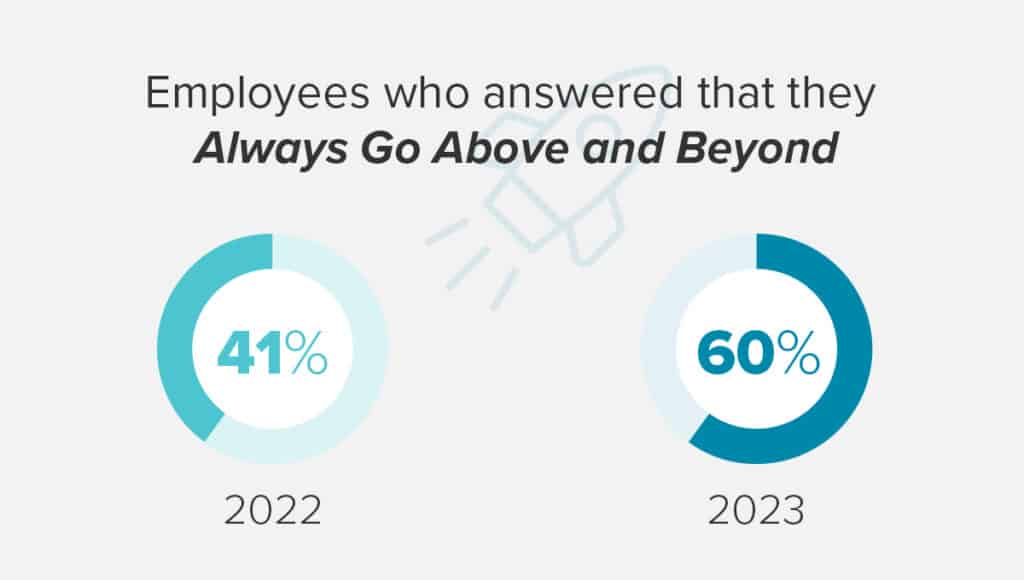
Overall, this is good news. But it begs the question, “Why are so many employees still seeking to change roles?” While our survey showed the number of people looking for new roles, especially passively, is lower this year (40%) than last (46%), the change is modest. Despite all the efforts HR has made — and there have been many recently in the form of new programs and policies to improve employee well-being and workplace culture — employees still feel like they’re getting shortchanged.
These sentiments reveal themselves in concerns over performance reviews and career opportunities.
Most employees want to stay
One of the most surprising findings from the report is that most employees want to stay and bloom where they are planted: 75% said they would rather remain with their company and advance in their careers. Passive job searching has dropped significantly over 2022, and more people plan to either stay in their current roles or look internally, according to the survey data.
Despite the news headlines about quiet quitting and rage applying — while these happen — employees want to stay if their employers are willing to develop them. This may be a “limited-time offer,” however. If organizations fail to act on career development and advancement, employees will likely look elsewhere.
Fairness matters, but performance management doesn’t deliver it
Our survey revealed that “fairness” is the most crucial aspect of the employee experience. Rounding out the top five are good work culture, flexibility, growth, and having a supportive team.
Most employees feel positive about work. As mentioned earlier, productivity, confidence, engagement, and optimism top the list. While these are all good signs, employees see room for improvement. Only one-third say they always feel valued and belong at work.
This year’s findings reveal that employees still feel that performance reviews are biased: a quarter see performance reviews as somewhat or completely biased, while another 37% say they are somewhat fair and equitable. The latter ‘glass-half-full’ sentiment means that reviews are also somewhat biased. Only 30% of respondents feel these reviews are very fair and equitable.
Performance management is undermining employee sentiment
Since 2020, almost half of companies have made changes to their performance management processes, tools, or both, according to survey respondents. Still, more than 1 in 3 employees (37%) with an opinion gave their performance management processes a grade of “F.” When it comes to their performance, ability to align with their company’s strategic goals, and career growth, these employees believe their companies’ performance management systems are an outright failure.
They also see the activity as a waste of time. Fewer than one-third believe their performance management process always helps them perform better at work, and nearly two-thirds (64%) see it as a partial or complete waste of time.
Biased performance reviews undercut trust and damage retention
Our data shows that poor performance management damages employees’ trust in their leaders, leads to a decreased sense of belonging and inclusion, and tamps down employee productivity by 23% and engagement by 14%.
When employees view performance reviews as biased, trust in managers drops by 23%. Feelings of belonging also plummet, and employees are twice as likely to look for a job elsewhere — whether actively or passively. However, there is sunlight that borders the edges of this cloud: Trust in leadership, HR, and managers goes way up — by a factor of 2x to 4x — when employees see performance management as successful.
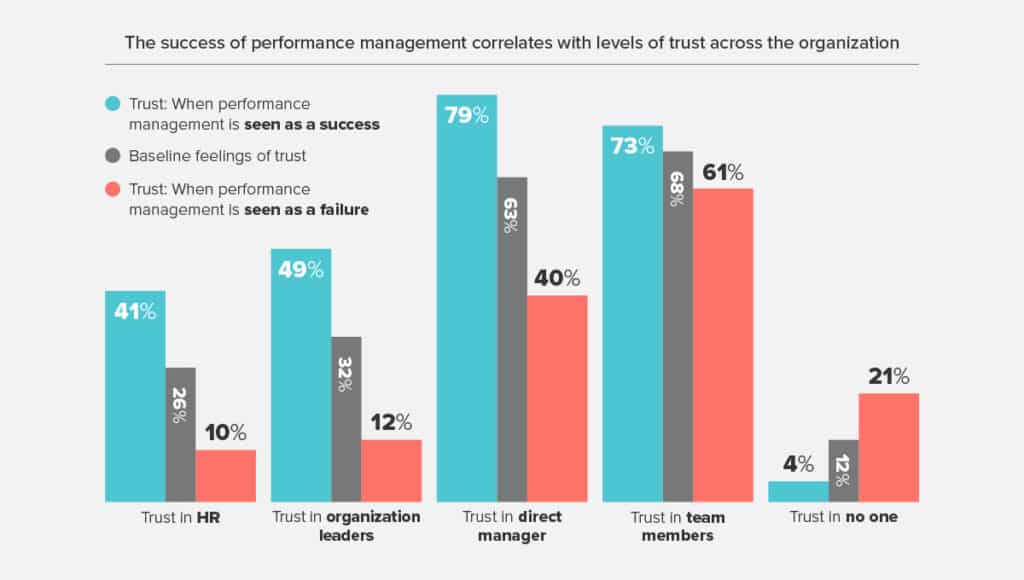
Career dead-ends are forcing employees to leave
Employees were loud and clear about the importance of career growth and advancement, ranking it second only to compensation as a reason to stay (and the lack of career development as one of the top reasons to leave a job). Unfortunately, less than half (48%) of people see a path forward in their companies. Even fewer employees feel their organizations care: Only one-third (38%) say their organizations fully support them in both their performance and career aspirations. The news is more disheartening for front-line employees.
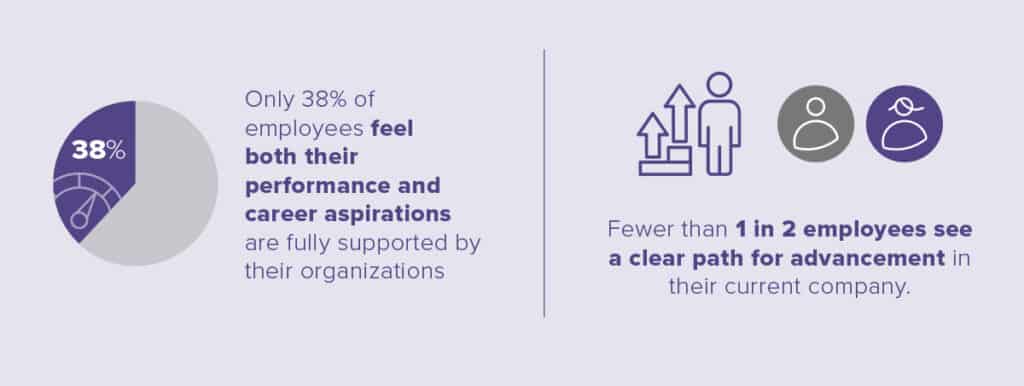
But, the opportunity to retain and grow employees is tremendous, given that three-quarters of employees would prefer to advance in their current companies. How to best do so requires a multi-faceted approach that includes promoting ongoing career development conversations between managers and employees.
Managers are the linchpin to career growth and retention
It makes sense that managers greatly influence their employees’ career growth and trajectory. Managers who cultivate strong relationships built on authentic and ongoing conversations in which they get to know their employees professionally and personally will naturally engender more trust. In the survey, employees expressed the highest levels of trust in their managers (63%), and just over half say their managers are a help to them in their careers. Even so, one-third say their managers have no impact on their careers.
Managers’ effectiveness might be higher if managers felt better prepared to help their employees with what they care about. But managers feel ill-equipped to coach employees for career development, with slightly over half of managers expressing confidence in their abilities.
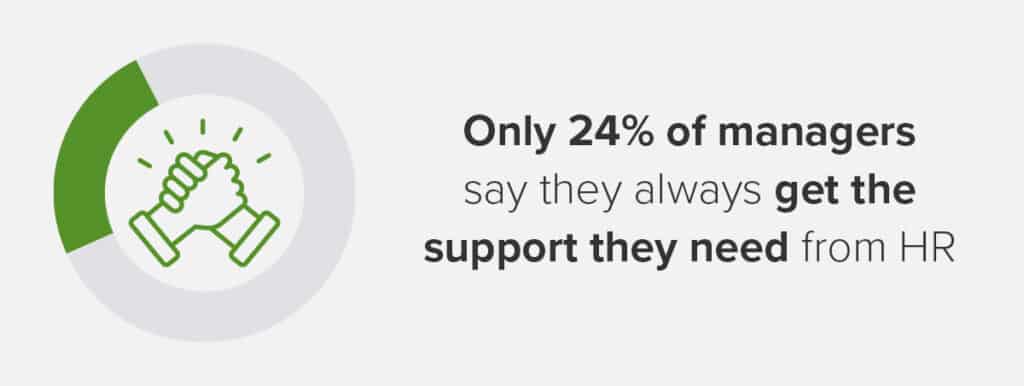
Managers tell us they want more resources and tools from HR to coach their employees. And the need for organizational support and resources is even more critical for less tenured managers, whose employees tend to be less satisfied than employees working for experienced managers. According to our survey, managers want more guidance coaching for performance, help with reviews, assessments, and ratings, and assistance with helping employees develop skills and careers.
Retain employees by enabling performance
Employees desire fairness. They want performance management processes that actually help them perform better, which is why companies need to rethink performance management. Employees expect their companies, especially their managers, to do a better job of helping them grow and develop in their careers.
Frequent 1:1 check-ins with the people employees trust most — their managers — are an essential tool in the performance enablement toolbox. The research showed that employees who are always satisfied with their career development check-ins are 7.5x as likely to see a path for internal advancement and are 66% less likely to look for work with another employer.
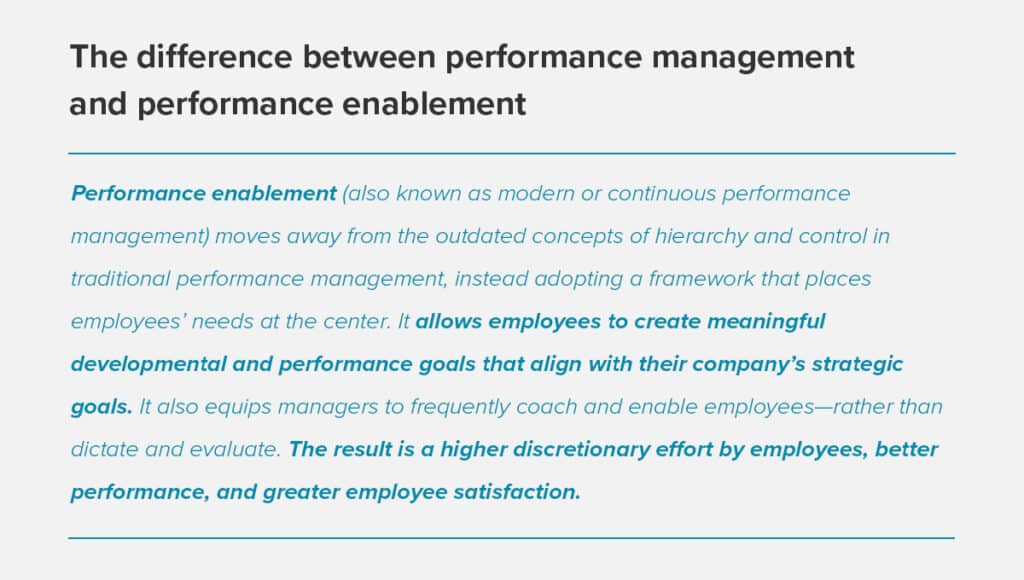
According to the survey, employees who receive proper performance enablement — including agile goal-setting and tracking, feedback, and meaningful and ongoing performance and development conversations — are twice as likely to feel they always belong and are valued at work. The data shows better results across the board, including higher productivity, confidence, engagement, optimism, focus, and relevance — and lower stress levels, burnout, and overwhelm.
The outcomes are highly positive among employees with dedicated tools for performance and career development. An overwhelming majority say they see a path for career advancement with their company and view performance management processes as helping them perform better at work.
Inaction is costly
The results of this year’s survey clearly show the high cost of sticking with outdated or ineffective performance management processes and tools. The wrong approach sows distrust and correlates with a lower sense of belonging and value. It yields lower engagement, productivity, and retention, which costs businesses dearly.
Fortunately, for organizations, this is a very fixable problem. The right approach elevates and empowers people, culture, and businesses.
To learn more about this year’s findings, download your copy of the Betterworks 2023 State of Performance Enablement report.
The State of Performance Enablement survey was conducted in late December of 2022 randomly sampled 2029 fully employed adults in the US and UK. About half (51%) were individual contributors, 31% were managers or supervisors (non-HR), 8% were non-HR directors or VPs, 5% were HR managers or above, and 4% identified as non-HR executives. Gender breakdowns were 55% female and 45% male. The survey had a margin of error of +/- 3 percentage points at a 95% confidence level.
Drive change that matters


